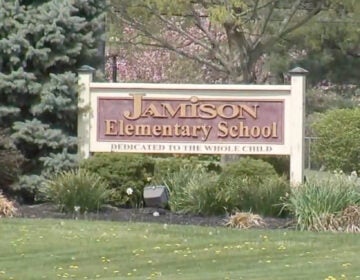From COVID to censorship: How a right-wing book ban took hold in Bucks County
In exactly one year, a relatively large and diverse school district went from debating masks to targeting LGBTQ books. Here’s how it happened.
Listen 37:37
Anusha Viswanathan, July 27, 2021, speaking at a press conference in support of stricter COVID-19 safety policies, as other Central Bucks parents in the crowd shouted over her. (Emma Lee/WHYY)
This is the fourth and final episode in the 2022 season of WHYY’s podcast “Schooled,” which tells the inside stories of people in our K-12 education system.
Note: The following transcript has been edited for length and clarity.
___
Avi Wolfman-Arent: Last week on Schooled we took you to the Central York School District. And introduced you to the students, teachers, and parents that defeated a book ban.
This week, we can’t do that. Because this week, we’re going to a place where the book ban is just getting started.
The district where we’re going is about to pass a policy, the first of its kind in Pennsylvania.
It could allow the school board to stop books in their tracks before they even get to library shelves…and for community members to challenge the ones already there.
This is a policy motivated by right-wing politics. Many of the words themselves are taken verbatim from a model policy out of Texas.
But what’s odd is that this district — the one about to make Pennsylvania history — is hardly in a deep red stronghold. In fact, it’s about an hour outside Philadelphia, in an area that’s relatively diverse.
The Central Bucks School District is Pennsylvania’s third-largest — located in a bucolic swath of suburbia. It is certainly not the first place you’d look for an anti-LGBTQ backlash. And yet, that’s exactly where you’ll find it.
This is Schooled. I’m Avi Wolfman-Arent.
We are going to show you how all of this happened: the anatomy of a book ban.
And then we’re going to explain how it’s already changing the academic atmosphere in Pennsylvania’s third-largest school district, with over 17,000 students. Book bans are coming. Meet the one that’s almost here.
Reporter Emily Rizzo has our story.
Emily Rizzo: Anusha Viswanathan remembers when she first started to feel afraid of other parents in her school district. It was July of 2021.
Anusha Viswanathan (at press conference): Which brings me to my second point…
ER: She was speaking at a press conference before a school board meeting about COVID-19 safety policies. Some parents wanted more rules — especially masks — others less, and definitely no masks.
Parent: Murderer! Murderer!
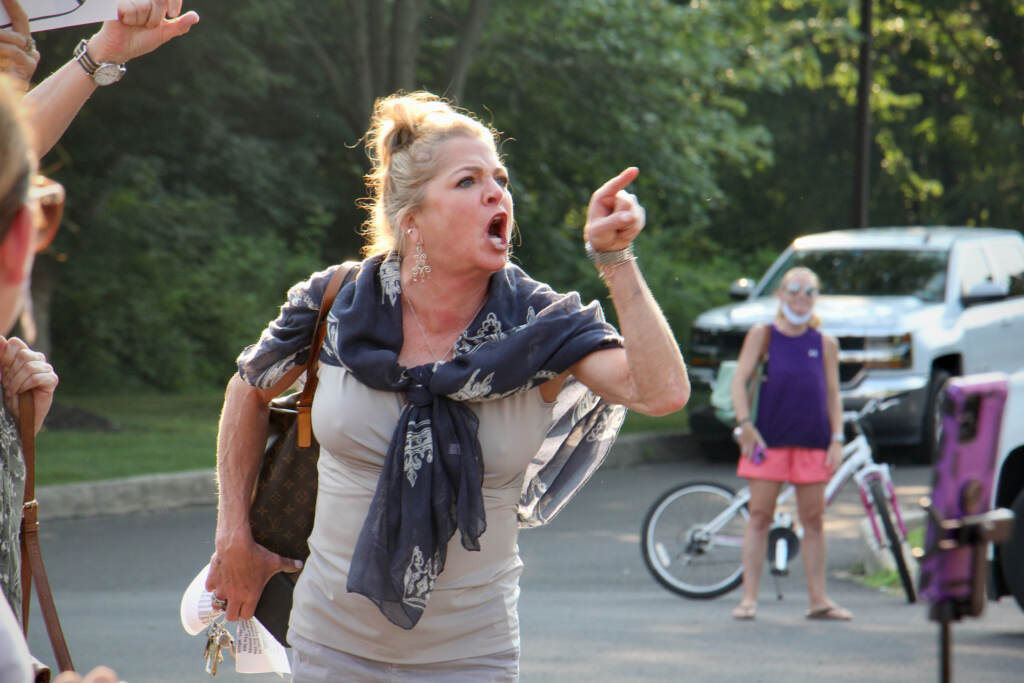
ER: She was surrounded by neighbors, old friends, turning on each other. She tried to make a point about COVID safety, but then someone called her an illegal alien.
AV: I think the intent was to make me feel like an alien in my community — like I was the interloper in my own community.
ER: People in the crowd accused her of child abuse for supporting masks. Viswanathan has two children in the district, and she’s a pediatric infectious disease specialist. She’s also an immigrant from India and relatively new to the area. This was her introduction to the community.
AV (at press conference): We are in a pandemic of the self over others.
ER: That day in July, Viswanathan sensed this undercurrent — almost like a new force taking shape in her community. This debate about masking suddenly felt like a proxy battle in a larger conflict. Today the topic was public health policy. Tomorrow, it would be books.
AV: I think of it like it is a gateway drug. I think of, like, anti masking and anti…this misinformation of COVID as, like, a great way to capture an audience. Because you are powerless in the face of a pandemic.
ER: The rage over COVID policies became so heated that many parents no longer felt like they could speak up. Some withdrew. But others leaned in, determined to seize the moment. Some ran for the school board.
AV: I see it with my own eyes. It’s the same people over and over who make public comments.

ER: At the heart of this shift is a small group of people who have seized control of the Central Bucks school board. One of them is Debra Cannon. And Cannon’s trajectory tells you a lot about how we got here. She didn’t respond to my requests for an interview, but I have tape of her speaking at board meetings.
Debra Cannon (at school board meeting): My name is Debra Cannon. I’m from Warrington…
ER: This is Cannon in May 2021, speaking, as a parent, at a board meeting.
DC: The treatment of our children during this pandemic has been an eye opening to the deception and lies perpetuated by the people in this room — along with your collusion with unions, community activists, private physicians, organizations that push an agenda for political and financial gain — to steer their ideologies about sexuality and to instill fear and compliance into our children’s minds.
ER: At another school board meeting, she said the district’s human growth and development classes, about puberty, were “grooming” children because they show images of body parts — what she called, “sexual organs.”
DC: Right now as we speak there are demonic adults recruiting, brainwashing, and participating in unconscionable behaviors with children. And every one of you know it. There are parents who are fooled And parents who will protect. I know which parent I am.
ER: Cannon was a vocal member of a Facebook group called Moms for Liberty Bucks County PA. Moms for Liberty is a national group that fights for book censorship.
When she ran for school board, she and two other candidates were endorsed by the right-wing Proud American Patriots Network. The PAPN was linked with the Three Percenters movement, a right-wing militia group.
If you thought Cannon’s fringe ideas and connections would make her unelectable in this politically mixed suburb, you’d be wrong.
In November of 2021, Cannon won. Her victory would help set the table for a new district policy on books.
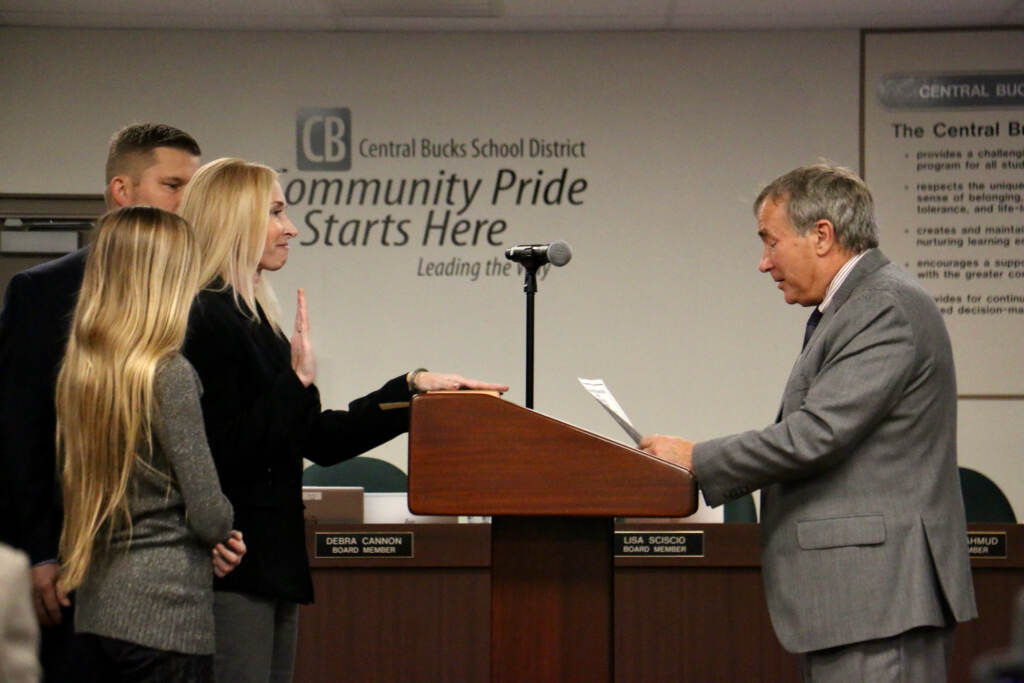
And her victory set many of her neighbors on edge, including one of her new constituents, Anusha Viswanathan.
AV: I fear that policy changes are coming with this rhetoric. It feels imminent because it feels like it’s going to affect my child, either in a very personal level, or truly all the children in this district.”
ER: Two other new insurgent candidates won their races for school board — both endorsed by the Proud American Patriots Network. And one was also a member of Bucks County Moms for Liberty.
Now they were part of the majority. Out of the nine board members, six were Republican, and three were Democratic. And moving forward, a majority vote was their most powerful tool.
So, soon after the elections, the agenda in Bucks County switched from COVID protocols to books. The new board proposed a brand-new book policy for the district — one that could set a blueprint for others to follow.
Before the school board elections, there had already been some rumbling.
In October 2021, a few parents started talking about inappropriate books at school board meetings. Just a few. Literally three people. All while more parents started organizing on a community Facebook page.
And by November, these little ripples had caught Kate Nazemi’s attention.
Kate Nazemi: I laid out on the table a timeline of everything. And I categorized all the pieces of this puzzle So if we want, we can look at that.
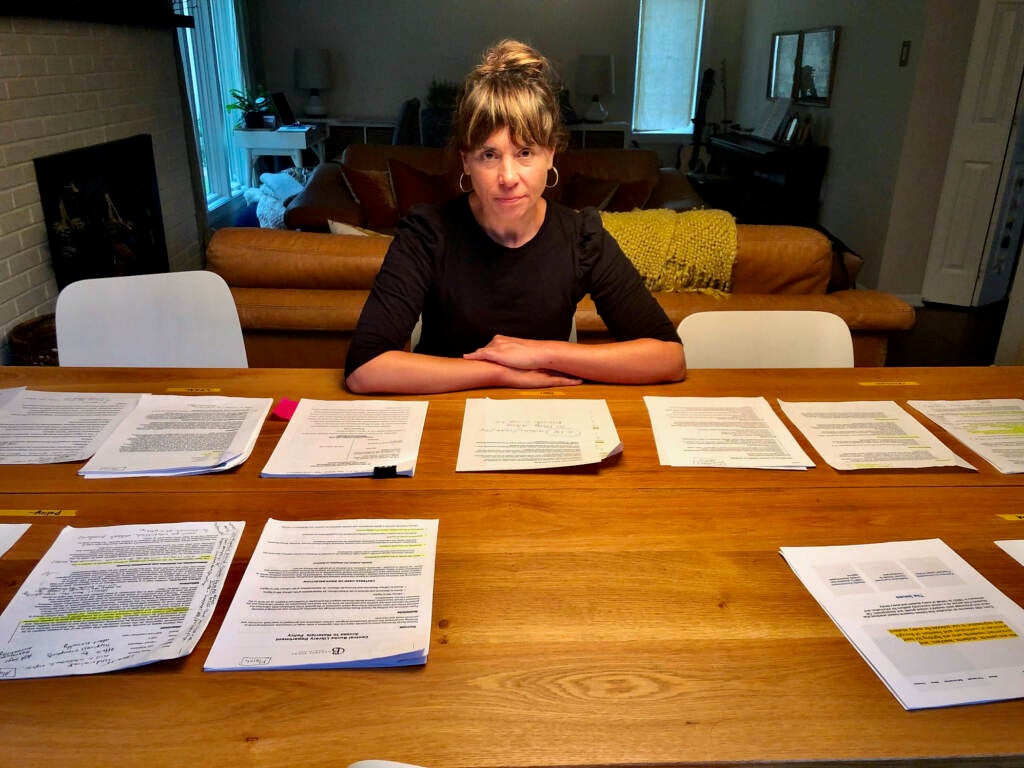
ER: Nazemi is a district parent who has been following this proposed policy closely. Her dining room table is covered in piles of paper. She’s like a local detective who only cares about school board meetings — dining-room-turned-crime-scene. There are 16 piles of documents that she’s annotated, highlighted, and labeled with tape.
She walks around the table.
KZ: There are a lot of moving parts, but I divide it up into outreach, criticism, and press. This section is legal.
ER: She’s also just a mom.
KZ: I also got you a morning roll from one of our best bakeries in Doylestown.
ER: Nazemi moved here from Boston 14 years ago. She fell in love with the small town feeling — the people, the town’s quirks. She’s set up in a sunlit home, close to the heart of Doylestown, the county seat. She’s gone to the same bakery every week for as long as she’s lived here.
KZ: It’s a honey, sticky. That’s one of their top sellers. And they should never change it. And they don’t.
ER: She never expected to be pulled into a political firefight. But here she is.
Her timeline starts on November 13th, 2021 when someone created an anonymous website called Woke Pennsylvania, which has a digital footprint tied to the Proud American Patriots Network.
This Woke PA group warns of left-wing indoctrination in Pennsylvania’s classrooms. They want to “reclaim” schools. They have a list of books in Central Bucks libraries they describe as inappropriate and sexually explicit — books that have shown up on other, similar lists nationwide.
Many of the books have LGBTQ-related content. Woke PA’s motto: “Stop the grooming.”
By January, the parents publicly railing against books started to get the slightest bit of traction. Their group grew from three people to four.
Candace Biofore (at board meeting): We don’t have a policy right now for reviewing the library books. I want to talk about the sexually explicit books.
ER: But their demands had an audience. District officials began talking about creating a new formal library book policy. In February, some board members started to allude to this idea that they needed to weed out certain books.
Sharon Collopy (speaking at board meeting): There is no excuse for not knowing there is controversy about a book before it is brought into our libraries. You know darn well the books I’m talking about — “Lawn Boy,” and all the others that have graphic, sexual content.
ER: And then in March, the number of parents grew again — this time, from four people to 14. They read books and excerpts listed on the Woke Pa site.
Parent 1 (at board meeting): I’m going to read “The Bluest Eye,” by Toni Morrison. The tenderness welled up in him and he sank to his knees.
ER: One of the parents who helped organize people against the district’s COVID policies also helped enlist parents to show up at the school board meeting to speak about books.
Parent 2 (at board meeting): “All Boys aren’t Blue,” by George M Johnson. Nervous and drunk I listened and got on my stomach.
Parent 3 (at board meeting): So how do you raise morally sound children when they’re able to get books like this out of the library?
Parent 4 (at board meeting): Can you be certain and can you guarantee that these books and those passages and those pictures, those graphic pictures, are not being used to groom?
Parent 5 (at board meeting): We are also fighting to hold those accountable in our community who allow this to continue.
Parent 6 (at board meeting): If you are gay, straight, that’s fine. You’re allowed to be. But not in the Central Bucks School District.
ER: Repeatedly, parents would say they didn’t want a book ban — just a process that would allow them to have more of a say. And some claimed this wasn’t about LGBTQ content. They just wanted to make sure kids don’t have access to certain books that are inappropriate. They say these books are pornographic, perversion — that teachers could use books to groom or indoctrinate kids.
This grooming accusation has ramped up lately. It’s become a Republican talking point — weaponized against teachers and politicians who support LGBTQ rights.
Tucker Carlson: Recently the union held a conference to discuss how to indoctrinate school children without their parent’s knowledge.
J.D. Vance: If you don’t want to be called a groomer, don’t try to sexualize six- and seven-year-old children. It’s really that simple…
TC: Where are the dads? Some teacher is pushing sex values on your third grader. Why don’t you go in and thrash the teacher?”
ER: In Central Bucks, a Facebook group that espoused some of these ideas has about 800 members. Mind you — in terms of public comment — in total, only about 20 parents have ever shown up.
And when parent Kate Nazemi circulated a petition in support of the books that had been targeted, it quickly got over 2,000 signatures.
KZ: For that to go ignored month after month is really bad policy making. You know, there’s not even a discussion around it.”
ER: To Nazemi, it felt like the book obsession was still kind of a niche thing.
KZ: The Woke PA group came and spoke in March, and we haven’t heard from them since. It doesn’t seem to have a lot of community support.”
ER: But it definitely had some support — and a real network behind it. In other words, it wasn’t totally spontaneous.
Powerful people were trying to draw a roadmap for parents — directing their anger over school closures into something else, and offering a framework. This was about parental rights. Choice, over government control. Freedom.
Paul Martino is a Central Bucks parent and businessman who donated hundreds of thousands of dollars to school board candidates who opposed COVID-related school closures — including all the Republican candidates in Central Bucks.
But after those elections, his PAC started to shift a little. In spring, they organized a training for parents about “how to hold your school board accountable.” In late May, they hosted another session called “Talking to your kids about social justice issues.” They shared this video as prep for the training.
Speaker: In the post-truth mindset, feelings and emotions dictate reality. If someone has a Y chromosome and feels as though they are a woman, then the rest of the world must accept that as reality and treat them accordingly. How did we get here? And that is where the contemporary Marxism comes into play.
ER: In the video, it teaches parents how to challenge their kids if, for instance, a kid comes home and says people can be trans.
Speaker: And what I said to him was this: Look, we’re not going to have any more conversation about this until you can give me a valid reason why it’s okay for someone with a Y chromosome to identify as female and demand that they are recognized in terms of concrete reality as being a woman. Why it’s ok for that, but it’s not ok for me to identify as though I’m Black, a woman, a lesbian, and disabled. Using your same criteria. And I let him sit in it.
ER: And the video tells parents to be patient. Eventually, kids will realize that people really aren’t transgender.
Speaker: And remember that this can be a long game. The absurdity of all of this will become apparent. And trust the process because it works.
ER: From this petri dish of parental anger and intentional, coordinated organizing — a new book policy surfaced. It first popped up at a Central Bucks board meeting this May — a couple of months ago.
The three Democrats on the board didn’t even know it existed.

The district’s librarians? They hadn’t seen the proposal, either.
Librarian (at board meeting): When was this drafted? Who drafted it? Whose input was used? It is evident that it’s been cut and pasted from something else.
ER: Then a report from the Bucks County Beacon revealed that almost 50% of the proposed policy was copied from a Texas policy. Here’s parent Kate Nazemi.
KZ: And I would’ve never expected that, in my wildest dreams. I just wouldn’t, that we would be here, but…
ER: Nazemi says this policy sends a message: Librarians and teachers are not to be trusted.
KZ: It breaks your heart. Good people are hurting for no reason. They’re not doing anything bad. It’s, like, all manufactured. It’s manufactured nonsense.”
ER: I’ve tried to contact the people who drafted this book policy, those who support it. And they’ve declined my requests to be interviewed or haven’t responded.
But, here is what the policy entails in broad strokes.
Most of the policy is about the book reviewal process — going over the books that librarians want to purchase. As board president and policy supporter, Dana Hunter put it.
Dana Hunter: We don’t have the ability to remove books. We only have the ability to restrict what goes in going forward.
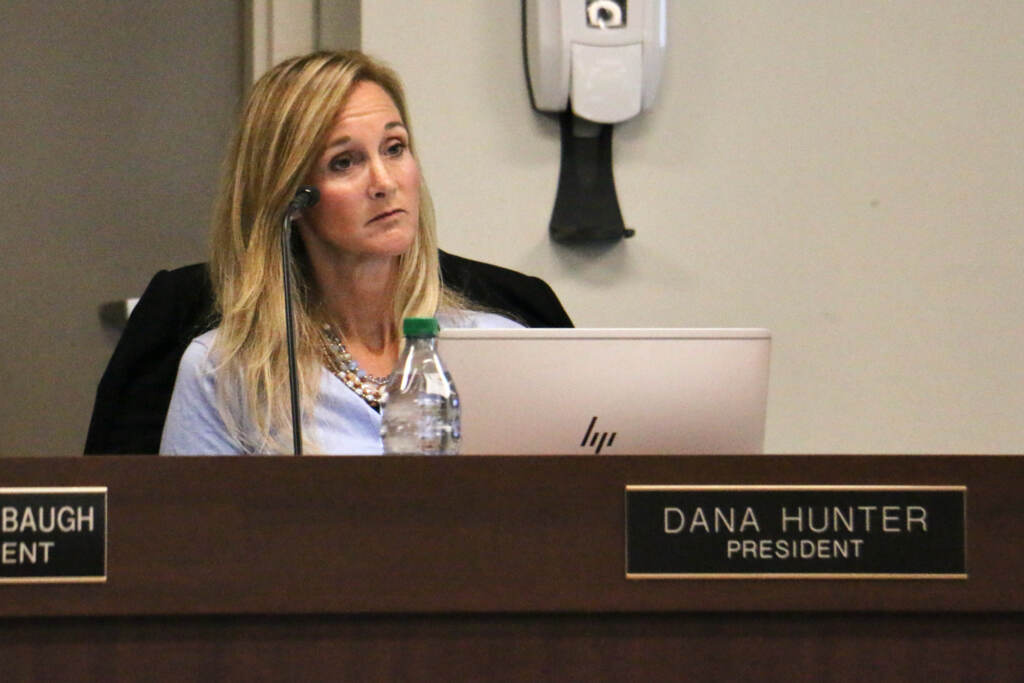
ER: The criteria for which books should be reviewed is not clearly defined, but it’s definitely about sex. Words like “inappropriate” and “sexualized content” are everywhere. It’s often vague. Like, books can’t have “implied nudity.
In most schools, librarians use professional reviews to decide which books to purchase, based on something called literary merit — where you look at the book’s value as a whole. In the new policy, there’s no mention of professional reviews. And that worries Kate Nazemi.
KZ: So then it becomes a very subjective, open-to-interpretation situation, which is the dangerous piece.
ER: The fear is that this policy is so vague it will paralyze the entire book-selection process — making it so librarians have no idea which books they can or can’t recommend. So, they might even have to ask for fewer books. I spoke to a librarian after a school board meeting. She asked to remain anonymous.
Librarian: And implied nudity could be something like, someone takes a shower. They are looking at their body in the mirror as it changes. It’s all kinds of things. And I will not know that that is in the book until I read it. And I can’t read it if I don’t own it.
ER: The way the policy is written makes it seem like this will all happen in secrecy. It seems to be, that librarians submit a list of books to get approved. Some would pass, some wouldn’t. And you won’t know which ones get rejected.
And while most of this new policy focuses on the books entering Central Bucks, there’s another part about the books already inside. Under this policy, Central Bucks community members would be able to challenge books currently on library shelves.
And once a book is removed, it doesn’t say for how long.
KZ: That’s it. It’s over. The book is gone. And what that means is that one parent, one community member, can take a book through the challenge process. And if it is successful, it removes it for everybody. It’s a dumbing down of education.
ER: Remember, the people who support this policy insist that it isn’t about book banning. The superintendent wrote to me and said that any effort to present any narrative to the contrary is detrimental and false.
But what’s happening in Bucks County has attracted the attention of the ACLU of Pennsylvania. Vic Walczak is their legal director. And he’s been watching.
Vic Walczak: I’m sorry, I’m beyond just looking at what they say. We’re going to be looking very closely at what they do.
And Walczak isn’t optimistic.
VW: The problem with vague laws like that is that it gives the censor unlimited power and authority to get rid of whatever they don’t like.
ER: And I talked to other experts in the field. They said they had never seen a policy like this in Pennsylvania. As it’s written, the policy doesn’t mention LGBTQ identities or content. But many in the district and the experts I spoke to say it’s a cover to target exactly that. Again, Kate Nazemi.
KZ: “Instead of coming out and saying, “We’re not comfortable with gender identity or sexual orientation.” They’ll just put this, sort of — the guise of sexualized content.”
This new Central Bucks policy may have caught the community off guard. But it didn’t take long for opponents to mobilize. At a school board meeting in late May, librarians, teachers, parents, and students packed the room. About 90 percent opposed the district’s new book policy.
Librarian (at board meeting): Every single student in my school is a reader with different needs. It is me, the professionally trained librarian, who gets to know them and connect with them with the right book. I am here for Brian, Dom, Sheila, Parasota, Diego. They deserve a policy that includes, not excludes.”
Allie Coffey (at board meeting): My name is Alexandra Coffey and I’m a sophomore at CB West High School. If these books are not appropriate for teenagers, nor is the world they live in, the world that you created. These books help tell these teenagers’ stories. These books help teenagers cope with the abuse that has been cruelly perpetrated against them.
ER: At one point, the book ban opponents asked board members if the prohibition on sexualized content would include classic literature, like the Odyssey, which references sex and nudity. And in a telling moment, board member Dana Hunter replied…
DH: A wide range of recognized classics should be maintained in each library. Please., it’s right here..
ER: So what were they trying to get rid of? The board never really clarified.
Employee (at board meeting): I’m sorry can I just ask a clarifying question?
Leigh Vlasblom: No. No. No. No. No. No.
ER: Under pressure, the board yielded, in a way. The original policy said the board members held ultimate responsibility for which books made it through the review process. At this May meeting, they changed the policy so that it doesn’t specify who would make these decisions…
Sharon Collopy (at board meeting): Somebody, somebody, somebody. The buck stops with, someone, with books.
ER: Parents, teachers, and librarians still fear the school board will have the final say — or have influence over whoever does. And soon, they’ll find out. At that May meeting, the board committee sent the rewritten policy for a full vote in front of the entire school board. That vote is expected in July 2022.
So that’s where we are now — a policy that’s not official yet, but crouched and waiting in the wings.
It all happened so fast: from mask fights in July to a school board election in November to this — a policy unlike any in the state of Pennsylvania. All it took was a handful of motivated activists linked into national networks — with some powerful people in the background.
We can’t say for sure what this policy will do. Maybe it will collect dust on the proverbial shelf while teachers and librarians and students move on with their lives. But the early indications are much different.
Teacher: And I don’t even know how to say this. We got this feeling that something was going to be happening with classroom libraries. And we didn’t know what it was.
ER: That’s a teacher in the district. She asked to remain anonymous, because she fears reprisal for speaking about this book policy. Employees in the district say they have already faced threats from the administration who’ve accused them of plotting with the media — including me.
In March 2022, this teacher received a warning from her principal.
Teacher: If you have a classroom library, be careful what’s on your shelf. Because there is no policy that protects teachers’ libraries.
ER: Naturally, her union reps wanted clarity. So she said they asked the school board: What does “be careful” mean?
Teacher: The message from the school board members was there shouldn’t be anything on the shelves that is sexual, violent, or has any other objectionable content in it. Which literally could be anything. So that kind of got me really nervous.”
ER: And in her nervousness, she began to go through the books on her classroom shelves.
Teacher: What I ended up doing was — I had been, which I’m sure you have seen since you’re looking at book stuff — was that Woke PA website.
ER: She used that site as a filter. And then she kept going.
Teacher: I kind of went through my library and it took hours. I mean, like 7 hours probably.
ER: She took out a book about a kid living through her parents’ divorce, because two girls kiss in it.
Teacher: It’s two girls that have a relationship. So could this get me into trouble? Maybe. I don’t know. It’s a mess right now.”
ER: She started looking at other sites that list undesirable books. She removed “Maus,” a book about the Holocaust. “The Warmth of Other Suns,” about the Great Migration? Gone.
You might be thinking, this teacher must be a special case. This is extreme. But I asked her if other teachers in her building were doing the same.
Teacher: Almost all of us put stuff away. And I think for most teachers it really cut their libraries in half.
ER: It turns out, when you don’t know the rules, you play it safe. Teachers tell me they’re scared of angering their bosses — scared of the parents who’ve turned books into targets. Things are accelerating so quickly, that it’s difficult to predict tomorrow.
Teacher: It’s so hard to say, but I don’t think anybody in this scenario is evil. I don’t think the admin’s evil. I think everyone is just trying to protect themselves because they don’t know what’s coming.
ER: But then I asked her what she thought of the school board.
Teacher: I think we’re all scared of the board. There are the six of them who have an agenda and I’m not sure what that agenda is. Honestly, I don’t know. My agenda every day is to make kids better readers and writers.
ER: So far she’s removed over 300 books from her classroom. In a small gesture of hope, she stored some of them in her classroom closet.
Teacher: For however long this lasts, I’m just going to do what I can to keep putting good content in my classroom, to keep having good books. Even if it’s not all of the good books I would want. And maybe in five years, we’ll be at a point where I can pull stuff out again and not be afraid.
ER: That’s the thing about policy fights like this one. The policy itself can have a chilling effect even before the ink is dry.
Julien Jones (at board meeting): I don’t want to come back to my school next year. But I’m going to because I’m not going to let you silence me. Over and over you constantly make decisions and talk over people like me and I’m not going to let you force me back into that closet that I was in.

ER: In Central Bucks, LGBTQ students say they already feel targeted — like they’re in a hostile environment. And there’s good reason for that.
In May, a principal told teachers to remove pride flags from their classrooms. The superintendent said the symbol was too political. One principal told teachers not to use students’ correct gender pronouns without parent permission.
This semester, the district suddenly canceled a training about LGBTQ issues for employees. Classes for elementary kids about puberty — the ones that school board member Cannon said were grooming kids — were made optional.
One outspoken teacher, Andrew Burgess, known as an advocate for LGBTQ students in his school, was suddenly placed on a leave of absence.
That was a massive blow to LGBTQ students in the school, including Julien Jones, a recently graduated eighth-grader who is trans and gay.
JJ (at board meeting): I lost one of the only people that has ever really cared for me — that really wanted to stay by my side and help me. I lost the only person that really cared about me as a person.
ER: The reason for his leave of absence is not yet clear. Students claim Burgess got in trouble after giving a bullied LGBTQ student the number for the Office of Civil Rights. The superintendent said the narrative that the district punished an employee for “being a supporter of LGBTQ+ students,” was offensive and false. But the district would not comment on the status of his employment.
Julien’s anger wasn’t JUST about losing his teacher. Everything about the last year has made Julien feel as if he’s under siege in his own school.
JJ: It’s just always very hostile. I’ve had a kid go up to me and scream in my face in the hallway just out of nowhere. I’ve had people tell me that they’re going to assault me and stuff — just casually. I’m like, “OK?” I get called slurs, like repeatedly.
ER: Julien is one of a few students who spoke regularly at board meetings. In a lot of ways it felt like screaming into a void.
JJ: It feels like I’m being bullied, but by literally everyone in power. I just don’t feel cared for. I feel like they just are, like, spitting on me, repeatedly. I just feel hated.
Students (protesting): Trans rights are human rights! Trans rights are human rights! Bring back Burgess! Bring back Burgess!
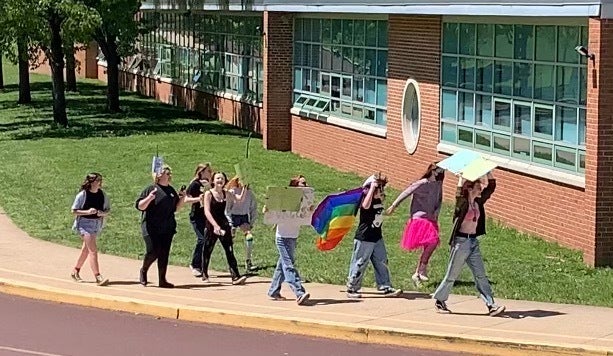
ER: The district’s LGBTQ students have tried to fight back. In May, they walked out of school in protest and were threatened with truancy. Students were told they couldn’t come back inside the building. One high school student was threatened with suspension.
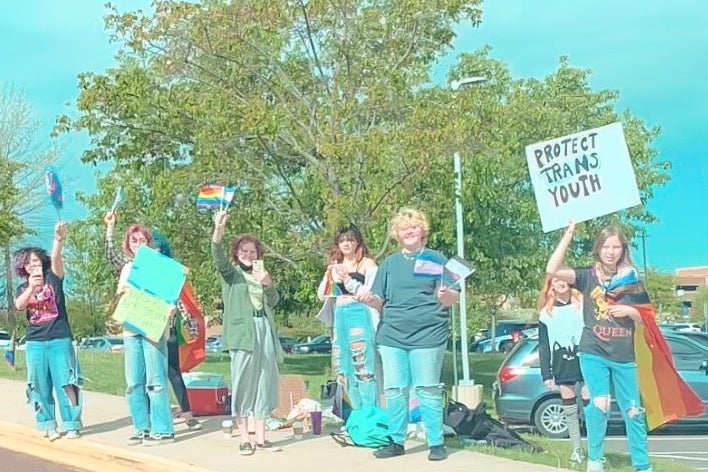
But high school students kept pushing. They organized a protest against the ban in June.
Students (protesting): Bans off books! Bans off books! Bans off books!
ER: Students also organized a rally for trans rights, in the heart of Doylestown.
Moth Weintraub: “It was really heartwarming — like, just thinking about it.
ER: Moth Weintraub is a rising senior at a district high school who helped organize the rally.
MW: I get kind of overwhelmed because it was just — it was amazing. There were people from all different districts, all different schools that came out. I hope that it helped people feel a little braver to be who they are in public and know that, like, they’re not the only ones going through this.
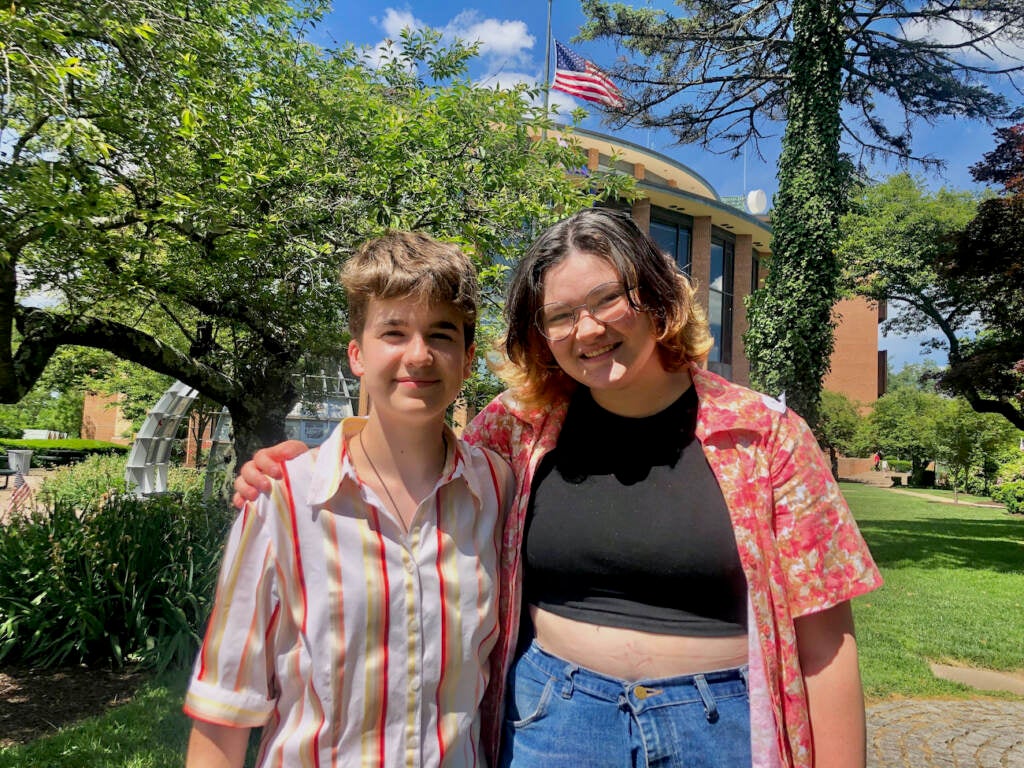
ER: Moth is trans and nonbinary. And the last year has been a marathon for them.
MW: It’s exhausting to have to fight for your right to exist and not be judged or penalized or censored for it.
ER: As for what Moth wants from their school district, it’s simple.
MW: As long as they’re trying. As long as they’re trying to see me for who I am — really, for right now, that’s all we’re asking. To just make little adjustments. Because we deserve that much.
ER: The next board meeting is in late July 2022. In that meeting, the board will vote on the book policy. While I can’t say for sure what will happen, many observers believe it’s a sure bet to pass.
What happens next?
There’s already a parent activist looking into how the district teaches race and history. That could be the next evolution of the conflict in Central Bucks.
And if the pattern of the last year holds, the fight over LGBTQ content will pop up in another district. Another policy will surface. It will trigger another skirmish in the culture war.
In fact, Central Bucks students and parents are already hearing from folks in other districts. They’re starting to coordinate among each other and build up their own grassroots movement.
And that is what gives some of the book-ban opponents hope — the fact that there’s this community of people in the fight together.

It’s now been one year since parent Anusha Viswanathan was shouted down at the community meeting last summer. Lately, she’s been thinking a lot about something a Central Bucks teacher told her.
It was in a meeting about her son who has special needs, before the school year started. It was this little nod of encouragement — one that let her know there’s a current of support underneath the noise.
AV: She said, ‘I just want you to know your kid will be loved here.’ Because that’s what you want, right? You want your child to be loved. You want your child to be challenged, yes. This is a learning environment. But the ultimate thing is, deep down, when your child is different — you just want people to see them for the lovely human that they are.
ER: With that as motivation — students, parents, and teachers who oppose the ban say they’ll keep pushing back.
AV: You have to take the step to engage in your community. Otherwise, these voices will one day come for you — to reclaim you, something from you.
AWA: “Schooled” is produced by WHYY in Philadelphia. This episode was written by Emily Rizzo.
It was edited by me, Avi Wolfman-Arent, with major help from Maiken Scott, Michaela Winberg, Kenny Cooper, Danya Henninger, Katie Meyer, Lindsay Lazarski, Grant Hill, and Sophia Schmit.
Engineer Mike Villers mixed the sound. WHYY’s vice president of news is John Mussoni.
As we wrap this season of Schooled — our fifth — some special shout-outs are in order.
“Schooled” is made possible by a grant from the William Penn Foundation. Kevin McCorry is the founding force behind Schooled. And finally, thank you to the marketing, design, and social media teams at WHYY — who are probably the reason you know about this podcast to begin with.
WHYY is your source for fact-based, in-depth journalism and information. As a nonprofit organization, we rely on financial support from readers like you. Please give today.






